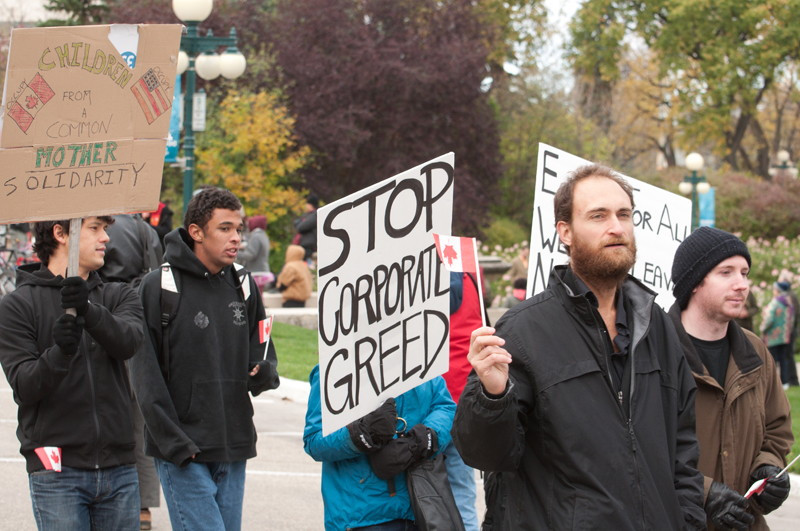Occupiers carry on despite being shut down
‘We need to make sure we have this presence in the city,’ says protester
After the controversial dismantling of their camp in late December, members of Occupy Winnipeg are utilizing new ways to spread their message and attempt to influence public policy.
Although the occupiers have not disbanded, they have been keeping a low profile. Rather than boasting a fixed calendar of activities for the coming months, the group’s plans are in a state of flux.
Currently, the group has been holding small demonstrations at the Shops of Winnipeg Square and handing out leaflets, something Kristaps Balodis, one of three remaining campers present when the camp was shut down Dec. 21, says will continue for the foreseeable future.
“Even to this day, I will come across someone who has not even heard of the Occupy Wall Street movement ... which is why we need to make sure we have this presence in the city,” said Balodis.
The camp, established outside of the Legislature on the grounds of Memorial Park in mid-October, was one of the longest-running occupations in Canada.
However, the province shut down the camp for safety and security reasons.
Still, the dismantling is a contentious topic.
Although Balodis acknowledged the safety risks (most notably a mysterious tent fire he suggests was an act of arson), Balodis expressed regret the province did not “work with us.”
He also stated that the officials carrying out the dismantling acted “disrespectfully,” damaging the main yurt that stood at the camp’s centre.
While acknowledging the protester’s frustrations, provincial cabinet press secretary Rachel Morgan dismisses claims of heavy-handedness by police and provincial security officials stating that “the officers were respectful of the protesters and they left without incident.”
In addition to criticizing Canada’s widening economic inequality, the group took on a distinctly local flavour.
One recent new goal of the movement is to voice opposition to the recent transit fare hike, although no specific activities have been planned.
The group also calls for action to combat urban child and family poverty.
Dr. Ian Hudson, an economics professor at the University of Manitoba, believes the central issue of income inequality requires a two-fold approach.
“Governments can address inequality at two stages - in the labour market and redistribution using taxes and transfers,” he said.
The latter involves implementing a robust progressive taxation system while the former rests on reducing unemployment and ensuring the presence of a strong, unionized workforce, Hudson said.
Despite the tension created by the camp’s dismantling, Morgan praised the “number of important issues” the group raised.
Morgan said the provincial government has responded to Occupy’s call for the province to “keep moving in the direction of more fairness for all Manitobans.”
Morgan noted a number of anti-poverty initiatives that were unveiled last June.
Two of these initiatives include job training for welfare recipients and help for college students on social assistance, both of which could serve to reduce unemployment and improve income inequality.
In addition, the government created a new Department of Children and Youth Opportunities last week, a development specifically aimed at combating the child poverty.
Rookie MLA Kevin Chief (Point Douglas) was given that portfolio.
Published in Volume 66, Number 16 of The Uniter (January 18, 2012)








